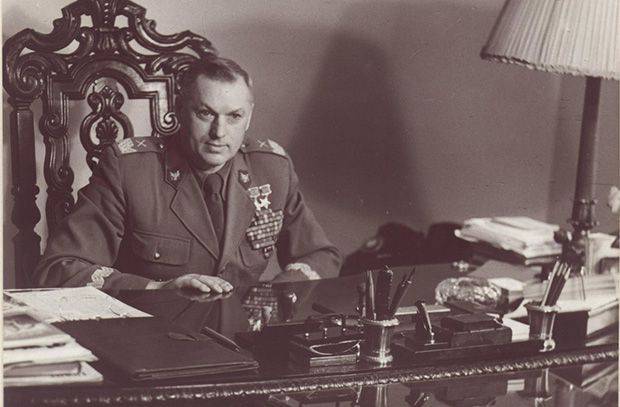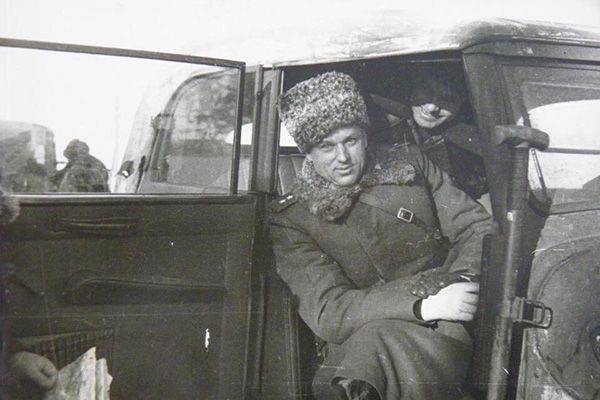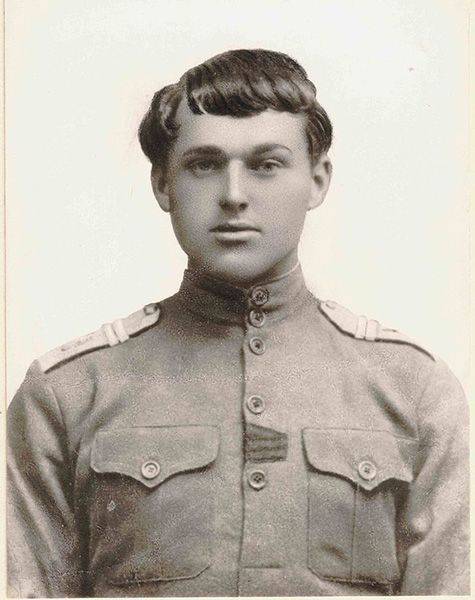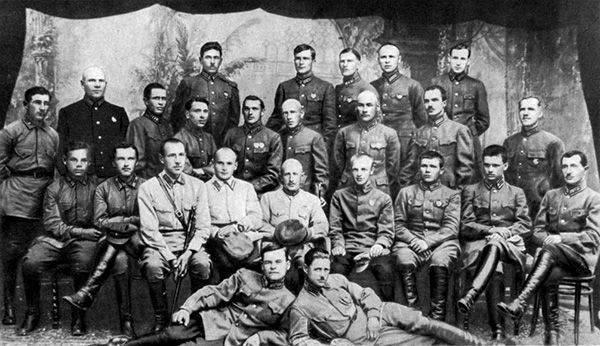Son of two nations, Marshal of two armies: Konstantin Rokossovsky

As a hereditary nobleman and a distant relative of Baron Peter Wrangel, he entered the service in the Red Army and became one of its greatest commanders.
When the 24 of June 1945 of the Year in Moscow on Victory Day Parade took place on Red Square, it was this man who was given the highest honor to command them. Marshal of the Soviet Union Georgy Zhukov took the parade - the same one who commanded the 1 Belarussian Front, whose troops took Berlin. And the commander of the parade was his predecessor in this front-line post, Marshal of the Soviet Union Konstantin Rokossovsky.
In the face of these commanders, the country saw, in fact, two main directions of the Soviet military school. First, Zhukovsky is a harsh, equally merciless one both for one’s own and for one's enemies, putting the achievement of the goal at any price at the forefront. Secondly, Rokossovskoe is much more respectful of a man in uniform and therefore the most valuable is the ability to predict the plans of the enemy and achieve results with the least possible losses.
That is why Marshal Zhukov was remembered most often with the words “Oh, and cool! ..”, balancing his admiration for him as a productive commander with his fear of him as a boss. And because of this, Marshal Rokossovsky was most often spoken of “Clever Man!”, Putting in this short word not only respect for the commander, but also admiration for his ability to respect others.
And hardly anyone from the inhabitants of the Warsaw suburbs, where 21 December either 1894, or 1896, the future marshal was born, suggested what fate awaits the boy. And there would be even fewer those who would venture to predict that it was the son of a poor Polish nobleman who would become the only marshal of two countries in Eastern Europe: his native Poland and the Soviet Union, who became his second, and in fact the main homeland.
Mysteries of the future marshal
A diligent biographer who would take up writing complete and accurate stories life of Konstantin Rokossovsky, you can only sympathize. While the biography of one of the greatest Soviet commanders since the spring of 1940, is not a mystery, his earlier life, in fact, is what it is.
And it is worth starting with the year of birth of the future marshal. He himself in numerous autobiographies initially indicated 1894 year. But with 1919, another date appears in the documents: 1896 year. Apparently, the later year of birth should be considered reliable, and the early one is the result of Rokossovsky’s own additions, which took him a job. And he had a chance to make it as soon as possible! In all the Soviet biographies of the marshal it is said that he was the son of Polish railway engineer Xavier Rokossovsky and Belarusian teachers from Pinsk Antonina Ovsyannikova. Her father died early, in 1902, and his mother, who did not work in her specialty, but at a hosiery factory in Volya, could not contain little Kostya and his two sisters, Maria and Helen. So the boy, who barely knocked six, had to be hired for his first job - kneading dough in a Warsaw confectionery. It was then that I had to make Kostya, more precisely, Constants (Konstanty Rokossowski), as he was called at that time, according to all the documents, would be two years older.
The solution of the riddle with the year of birth of the marshal is directly connected with another riddle - its origin. In all the biographies of the Soviet officer Konstantin Rokossovsky, it was specially emphasized that he was the son of a railwayman and a teacher: it fit perfectly into the concept of proletarian-intelligentsia origin. Indeed, no one will doubt the class loyalty of a person who inherited from his father's commitment to the working class, and from his mother - love of books and the desire for self-education! In fact, the father of Konstantin Ksaveri Wojciech Rokossovsky belonged to the old Polish gentry Rokossovsky family coat of arms Glaubich. In the XIV century, the Rokosovo manor was given to the Polish knight of this clan as a reward for faithful service and valor, and so the name of Rokossovsky appeared in the Armorial of the noble families of the Kingdom of Poland, and then in the Coat of arms of the noble families of the Russian Empire.

Why the future marshal, and behind him and his official biographers, tried to sidestep this topic, it is clear: not to face twice the Hero of the Soviet Union to have gentry-ancestors! In addition, those who have tried with all their might to liberate Poland from the rule of Russia. Konstantin's great-grandfather, Lieutenant Jozef Rokossovsky, during World War 1812, fought in the ranks of the French army as part of the 2 Uhlan regiment of the Duchy of Warsaw. And much later, in 1863, the elderly Youzef took part in the Polish uprising and was imprisoned in the Warsaw citadel. It is not surprising that during the years of the Civil War, when everyone in Russia remembered the unsuccessful Polish campaign of Tukhachevsky, and the name of Piłsudski except children did not scare, Konstantin Rokossovsky preferred not to specify what kind of tribe his father was using.
By the way, a nobleman Konstantin was also on the line of Antonina Ovsyannikova’s mother. She was a representative of an extensive small local noble family known since 1621. Representatives of the clan lived throughout Russia: in the Tula province, and in Ryazan, and to the west - in Belarus.
Heir Rokasovskih von Wrangel
Finally, there is a third mystery in the biography: after the year of birth and origin, the place of birth also requires clarification.
In his early autobiographies, Rokossovsky himself wrote that he was born in Warsaw, where his parents lived. They are also buried there - at the Brodnovsky cemetery, the 15 site. Mother survived father for nine years, after which she rested next to her beloved husband. In Warsaw, however, both sisters Constantine remained to live after the collapse of the Russian Empire. The problem with exactly where Marshal Rokossovsky appeared in the world arose after the war, when he, as twice Hero of the Soviet Union, was supposed to have a bronze bust in his homeland. There was no question of doing this in Poland: although a fraternal socialist country, it was nonetheless a stranger. Therefore, in a hurry, Rokossovsky picked up a new homeland: the city of Velikie Luki.
The choice was not accidental, but the reason for a long time did not speak out loud. It is understandable: who wants to admit that the new “place of birth” was chosen by the marshal, on the basis of his noble origin, which alone connects him with Velikoluksky land!
The fact is that in the Great Onions after the middle of the XIX century there lived representatives of the baronial family of Rokasovsky. It was one of the branches of the Rokossovsky family: if a part of its representatives fought for the independence of Poland until the end of the XIX century, the other part put their talents in the service of the Russian Empire. Among them was Ivan Nikitich Rokasovsky - a retired brigadier, a landowner in the Gorodok district of the Polotsk province, who owned the Dubokray estate. In this estate were born two of his sons - the eldest Alexei and the younger Plato. They followed in the footsteps of their father, becoming military, and glorified the race in this field.
Alexey was promoted to the rank of lieutenant general, and Plato became a general from infantry, a member of the State Council, and in 1861 – 1866 he was the governor-general of Finland. But at the very end of 1854, by the highest decree, Platon Rokasovsky was raised with all his descending offspring to the baronial dignity of the Grand Duchy of Finland, and his daughter Vera became the wife of Wrangel von Podental. Thus, the kinship between the Rokasovskys and the Wrangels was once again supported: these surnames were sometimes even written through the prefix "von". In particular, it is known that in 1867, the exhibition “Baron Platon Ivanovich Rokasovsky von Wrangel” by Konstantin Makovsky was shown at the exhibition at the Academy of Arts. And there was nothing surprising in this naming of the general: the Rokasovskys, who came from the Dubokray estate, were representatives not only of this Polish gentry surname, but at the same time heirs of the Vitebsk branch of Wrangel, having been born in Russia since the 13th century!
So in the real biography of Marshal Rokossovsky there was a place for an amazing historical coincidence. He, who had sided with the Bolsheviks immediately after the October Revolution, miraculously did not make it to the southern front. Otherwise, Red cavalry Costa Rokossovsky would have had to fight against a distant relative - Baron Peter Wrangel, the last leader of the White Army.
From Warsaw Confectionery - to Dragoon Regiment
Despite the “warlike” origins and the fact that, as the marshal himself later admitted, “from early childhood I was fascinated by books about war, military campaigns, battles, bold cavalry attacks ... My dream was to try everything that was said in books most "on the military path, he stepped away immediately. After the death of his father, the boy, who had added himself to himself for a couple of years, began a working "career" with a dough mixer in a candy store. After that, he managed to change a few more specialties: he was an assistant dentist, he worked in a stocking factory with his mother and sisters. There, Konstantin first became acquainted with the labor movement and became so absorbed in them that 1 of May 1912 of the year came to a demonstration, which ended with an 6-week prison sentence for him.
He came out of there only through the efforts of his uncle Mechislav Davydovskiy, and since he was no longer willing to put up with the young revolutionary at the factory, he went to work as a stonecutter in the workshop of another uncle - Stefan Vysotsky, his aunt Sofia’s husband. Two years later, together with Frantisek Rokossovsky who worked in the same workshop (the son of Uncle Konstantin carried the mother's surname), Vaclav Stronkevich and Kazimir Kizhkovsky, Konstantin Rokossovsky went to the front.
All four went to the war voluntarily, already on the second day: the order of enrollment to the service is dated 2 August 1914. Since Konstantin did not have time to get the six-grade gymnasium education necessary for a volunteer (volunteer), he and his comrade Vaclav were enlisted in the 5 th dragoon Kargopol regiment in the status of “hunters”. As stated in the order, signed by the assistant regiment commander for the combatant unit, Colonel Arthur Schmidt, “the peasant Vatslav Stankevich (the clerk made a mistake in writing the name. - RP.) And the tradesman Konstantin Ksaveryevich Rokossovsky, born in 1894, are considered to be enlisted the regiment as hunters. "

Comrades were assigned to the sixth squadron of the regiment and almost immediately involved in combat work. It is known that after Rokossovsky’s 20 days he distinguished himself on patrol. Having gone along with a colleague for reconnaissance, Konstantin pulled away from a comrade and one entered the village, in which, as it turned out, there was an enemy patrol. The Germans tried to capture him, but Rokossovsky himself rushed to the attack. Cutting down one of the opponents, he broke through the barrier and, despite the fact that he was fired after him, he managed to return to the patrol.
For his courage, Rokossovsky received the first award - the soldier’s Cross of St. George of the 4 degree - and was promoted to the rank of corporal. And by December 1917, not only this cross, but also three St. George medals (4, 3 and 2 degrees) flaunted on Corpora Rokossovsky's chest; also had two injuries. In addition, in the autumn of 1917, when the imperial army began to collapse not under the blows of the enemy, but because of the activities of revolutionary agitators, Rokossovsky unwittingly became one of those who managed to maintain the combat capability of their units. He, as a man who proved not only courage, but also the ability to lead others and do it at the expense of authority, not loud cry, was chosen first in the squadron and then in the regimental committee, who assumed the functions of command of the regiment.
The officer needs to believe in his case
It was then that the paths of the comrades for arms. Part of the dragoons, especially the Poles (and among them Frantisek, Constantine's cousin), refused to take the oath of allegiance to the new authorities of Russia and went home - to create an independent Poland. Kostya Rokossovsky and his comrade from the 5 Squadron Adolf Yushkevich enlisted in the Red Guard, which soon turned into the Red Army. For Rokossovsky, who had long and consistently sympathized with the labor movement and fully convinced that the communist ideals were fair, there was simply no other way.
This conviction, adherence to the ideals of communism, Konstantin Rokossovsky retained for life. He carried her through the Civil War, during which he joined the RKP (b) in 1919, inspiring by his example his comrades in arms, and after him the soldiers subordinate to him. Rokossovsky did not lose this faith even during the three years spent in 1937 – 1940 in the Leningrad “Shpalerka” - the internal prison of the NKVD regional department. There, by the way, he also managed to distinguish himself: when the evidence of that Yushkevich himself appeared in the “investigation” documents, with which Rokossovsky switched to the Red Guard and who died under Perekop in 1920, the defendant stated that he would sign everything, but only after full-time betting with an ex-co-worker. And, of course, did not wait for it and did not sign anything.

Rokossovsky remained loyal to the ideals of youth and in the first, most difficult days of the Great Patriotic War, which he, who was released on March 1940 during a major military amnesty initiated by Commissar Lavrentiy Beria, at the suggestion of Marshal Semyon Timoshenko, met the rank of Major General and post commander 9 th mechanized corps, which he himself had formed.
Complete the soldier’s duty to the end
The Great Patriotic War became the finest hour of the young - only 45 years old! - commander. For four years, he went through all the steps of the general — from the major general to the marshal of the Soviet Union, all levels of command — from the commander of the mechanized corps to the commander of the 2nd Belorussian Front. He was one of the legendary participants tank battle near Dubno - Lutsk - Brody, gathered from scattered retreating units near Smolensk "Rokossovsky group", which soon turned into the 16th army, famous during the battle for Moscow.
Konstantin Rokossovsky won immortal fame as the commander of the Don front during the Battle of Stalingrad and as one of the developers of the Uran plan to surround and defeat Field Marshal Paulus's 6 Army. He forced his troops on the Kursk ledge to literally burrow into the ground, and they were able to withstand the first, most severe blows of the Germans without major losses, and then went over to the offensive, which ended in complete success. It was he who, together with Vasilevsky and Zhukov, developed the famous operation “Bagration”, which brought the liberation of Belarus and the Baltic States and led the commander himself to the threshold of his native Warsaw. It happened to him with pain in his heart to observe how the Warsaw citizens perished in a senseless uprising by the “London government in exile” are dying, and its soldiers, exhausted by a long offensive, are not able to help them ...
Finally, it was he who was transferred from the place of honor to the commander of the 1 Belorussian Front, who was clearly targeting Berlin (“When fighting near Moscow, you need to think about Berlin. Soviet troops will definitely be in Berlin,” Rokossovsky said back in October 1941 the correspondent of the "Red Star"), on the 2 of the Byelorussian, designed to conduct an offensive against East Prussia. And this is due to him with his Berlin triumph, Zhukov, who a longtime acquaintance from command courses and academies made it possible to advance without thinking that the Germans could transfer reserves from the north.
And then there was the very parade, about participation in which the marshal said: “I took the command of the Victory Parade as the highest award for my entire long service in the Armed Forces”. And the post of Minister of Defense of the Polish People's Republic, which Marshal of Poland Konstantin Rokossovsky occupied from 1949 to 1956 a year, and the title of Marshal of Poland is the highest in the country.
Konstantin Rokossovsky did not leave the service until his death. Neither political intrigues in Warsaw, which cost him the post of Polish defense minister, nor political undercover games in Moscow on the eve of the 20th Congress, which cost him the post of deputy defense minister of the USSR, did not force him to resign. He remained in service until the last day: 2 August 1968, Marshal Rokossovsky signed into the set a book of his honest memories “Soldier Duty”, and the next day he, exhausted from the fight against cancer, did not. But even before that, he managed to accomplish what is given far from every marshal. 3 December 1966, Marshal of the Soviet Union, twice Hero of the Soviet Union Konstantin Rokossovsky personally carried the coffin with the remains of the Unknown Soldier, thereby paying tribute to the memory and respect for his fighters, with whom he had defended Moscow a quarter of a century before ...
Information